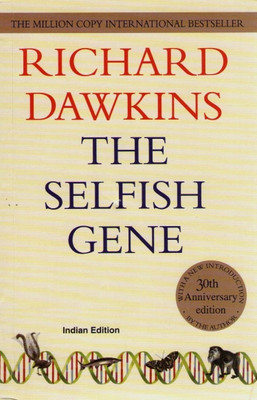The Selfish Gene(English, Paperback, Dawkins Richard)
Quick Overview
Product Price Comparison
The Selfish Gene provides a different view of evolution, a gene-centric one. The author says that the organisms do not drive evolution, genes do. Summary Of The Book Traditional understanding of evolution has always been from the point of view of whole organisms. Survival of the Fittest and Natural Selection have all been perceived as being dictated by the speciesŌĆÖ drive to survive. Dawkins turns this on its head. In The Selfish Gene, he says it is the genes that drive evolution, not the species. Each gene is motivated to replicate and pass on its own copies as long as possible. So, the fundamental competition for survival is between genes. In this race, the successful genes design the complex organism that it forms a part of. The organism's own survival is secondary. It is a vehicle to pass on its inclusive genes. The author does not use the word selfish in a sentient sense, to imply that the genes are consciously selfish. What the term in this context means is that the individual genes are automatically programmed to replicate and pass on their own characteristics, without any drive to cooperate with other individual genes. At the organism level, the cooperation and altruism among members of the same species also makes sense in this context. They share the same genetic code. So, if they care for other individuals of their species and even give up their life defending other members like their own offspring, they are just doing it to protect their own genetic composition. The gene-centric view of evolution also implies that gene survival can sometimes come at the expense of individuals of a species. For instance, in some spider species, the males are eaten by the females. Yet, the drive to pass on its genes overrides the maleŌĆÖs drive for individual survival. The Selfish Gene explains evolution as being driven by the competition to survive among the most basic units of life, the genes. It is a purely individualistic view rather than the collective view of the organism which is composed of countless genes coming together. About Richard Dawkins Richard Dawkin is a British evolutionary biologist. The Blind Watchmaker, The God Delusion, Climbing Mount Improbable, and The Magic of Reality: How We Know What's Really True are a few of his other books. Richard Dawkins was born in 1941 in Nairobi, Kenya. He graduated with a degree in zoology from Balliol College, Oxford, where he also later earned his M.A. and D.Phil. He taught at the University of California, Berkeley, as an Assistant Professor of Zoology, for two years from 1967 to 1969. He then joined Oxford University where he became a Reader in 1990. He has received honorary doctorates from several universities. He has also received awards for his writing including the Royal Society of Literature Award and the Los Angeles Times Literary Prize. He also received the Nierenberg Prize in 2009 for science in public interest.


